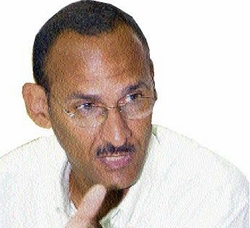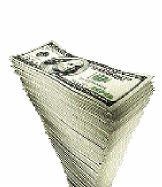
Dr Damien King, senior research fellow at CaPRI, says fix the economy first.
- Contributed
If Jamaica were to move to a fixed exchange rate regime, it would exacerbate conditions and create an even more unstable foreign exchange market than already exists, a Jamaican think tank said this week.
"Until Jamaica is able to achieve and maintain greater fiscal discipline, lower fiscal deficits, the question of a fixed exchange rate should not arise," said Damien King, senior research fellow of university-aligned CaPRI, who on Wednesday presented a paper on the issue.
There is no indication that Jamaica plans to move to a fixed rate regime, but the issue has cropped up intermittently over the years.
Most recently, it was former prime minister and a senior fellow at the University of the West Indies, Edward Seaga, who restarted the discussion - advocating for dollarisation, the more extreme form of a fixed exchange rate regime, where the country would switch to using a hard currency, in this case the USD.
Dollar falling fast
The debate was fuelled even more by the 14 per cent depreciation of the Jamaican currency last year - normally the annual decline is at or around five per cent - which happened notwithstanding the hundreds of millions of US currency that Bank of Jamaica, managers of the foreign exchange system flooded the market with to ease demand pressures.
The central bank followed up with interest rate hikes on Jamaican dollar instruments to tease investors away from the forex market.
And while the exchange rate eventually stabilised in the second quarter of this year, producers say it came at too high a price - more expensive capital and a higher cost of doing business.
King argued Wednesday that while both fixed and flexible or floating regimes have their strengths and weaknesses, both become undermined by fiscal indiscipline and monetary laxity.
"Fiscal deficits push up the cost of capital and generate unproductive inflows of foreign exchange to finance the deficit whether government borrows domestically or internationally," said the discussion paper he authored.
King also argued that emulating Barbados - a more prosperous Caribbean economy which has pegged its currency to the USD at approximately 2:1 - was not the answer.
"As much as every time we have a deprecia-tion of our currency we look with a meaty eye at our neighbour and the stability they have enjoyed, the case of Barbados is more an exception than a model for Jamaica," said King, who is also a lecturer in the Department of Economics at UWI.
Managed floatingexchange rate regime

Jamaica currently operates a managed floating ex-change rate regime, under which the central bank will sell foreign cur-rency to dealers of foreign exchange for resale under terms it dictates, thereby influencing the performance of the market.
The BOJ's strong interventions, at one time, had the Jamaican foreign exchange regime being redefined as a 'dirty float'.
The Jamaican currency has lost $9 of its value since the start of the calendar year and is now trading against the USD at $89.
Inflation, which determines the time value of money, is expected to hit double digits again this year, with a forecast of 11-14 per cent, while the Jamaican economy is projected to contract by about 3.0 per cent this year.
If the central bank is not disciplined in its monetary policy, restricting its issuing of base money to that which flows out through the foreign exchange window, "the extra liquidity will inflate the economy and eventually show up as unbacked foreign exchange," said King's paper.
Consequently, the central bank will eventually exhaust its reserves, King argues, and in that scenario would not be able to maintain a pegged or fixed rate.
He went further to suggest that the forex rate debate was misguided; that it ought not, at this stage, to be about whether Jamaica was to go fixed or floating, but rather whether Jamaica is able to manage its fiscal and monetary burden in a way that promotes stability.
Pressures
"Without fiscal discipline and monetary prudence, then economies develop macroeconomic imbalances that put pressure on the exchange rate," he said.
Those pressures, he noted, would exist whether the exchange rate regime is fixed or flexible.
Moreso for Jamaica to undertake a fixed exchange rate regime now would proved detrimental.
"Success with that type of regime calls for a level of fiscal discipline that has completely eluded Jamaica since independence," said King.
sabrina.gordon@gleanerjm.com